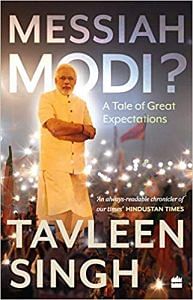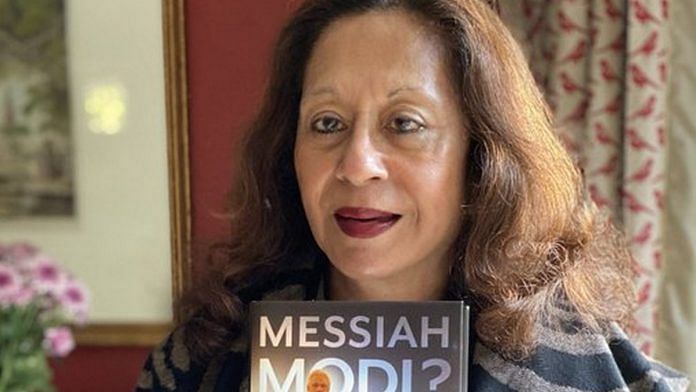Trolling took the form of questions. Why did you not write about the RSS worker beaten to death in Kerala? Why do you never write about Hindus beaten to death by cattle smugglers? Why are you so anti-Hindu? On my Twitter timeline I was inundated with questions of this kind when I wrote in my column that the videotaped beating to death of an old dairy farmer called Pehlu Khan was too awful to describe. He and his sons had gone to a cattle market in Jaipur and bought two cows for which they had documents for transportation and receipts. When they were taking them home they were stopped by vigilantes in an ugly highway town called Behror, dragged out of their truck and beaten so badly that Pehlu Khan died of his injuries.
This was in April 2017 and for me personally it became the moment when I began to seriously question my support of Modi. In a column that appeared in the Indian Express on April 9, 2017, this is what I wrote: ‘It is horrible to watch a man being beaten to death. And yet I forced myself to watch the video of Pehlu Khan’s lynching more than once. Not from cheap voyeurism but because I found it hard to understand why this was happening at all. The young men who kicked him and beat him with iron rods did not look like fanatics. They looked like modern young Indians. They wore tight jeans and fancy shirts that indicated an interest in fashion. They seemed educated and middle-class and, for me, this made their savagery more horrible. More disturbing. They took obvious pleasure in what they were doing and made it clear that their intention was not to harm Khan and his sons but to kill them. They videotaped the lynching and posted it on social media, so the Prime Minister would have seen it and the Chief Minister of Rajasthan. Why did they say nothing to indicate that they were sickened by what they saw?
‘In Parliament, a senior minister first denied that anything had happened at all and then bizarrely added that the House must be careful not to give the impression that Parliament approved of cow slaughter. The Home Minister of Rajasthan went one awful step further and said in so many words that both sides were to blame for what happened. Both sides? Both sides? A man was beaten to death in a manner that reminded everyone of earlier barbaric times when there was no rule of law. And there is another side? That this comes from the man who has the responsibility to enforce the law in Rajasthan is not just worrying but terrifying.’
Almost exactly a year earlier I had been granted an audience with Narendra Modi. I had gone to present him with a copy of my book India’s Broken Tryst that had just been published. It was only because of this that I was granted an audience. It was the first private conversation I had with him after he became Prime Minister. We met in that same room with glass walls looking on to manicured lawns in which I had last met him with a group of journalists more than a year earlier. He looked serene, well groomed and had about him an aura of power that I had not noticed in the days before he became Prime Minister. There was also a new coldness in his manner. He seemed to have forgotten how to smile and in his eyes was a messianic glitter as if talking to a mere mortal required effort.
As always, our conversation was uninterrupted by aides or phones. We talked about a lot of things, perhaps because this was not an official interview. He told me that he was unable to understand how to deal with the media, making it clear that the media had always treated him unfairly. When he was Chief Minister, he said, a journalist had criticized him for wearing designer glasses and expensive watches. He was hurt by the criticism. So he sent him to the shop in Ahmedabad where he had bought his glasses for many years so that he could see that they cost no more than a few hundred rupees. And shown him that he wore a simple Indian watch. He even sent him to the tailor who had stitched his clothes for years. He did this, he said, in the hope that the journalist would write that he had been wrong about these things. He never did.
Our conversation wandered about a bit. So we moved from his personal grievances against the media to the economy. I got the impression that he was worried that it seemed to be moving more slowly than he had expected and that foreign investors were not lining up at India’s gates with bags bursting with money. With a really gloomy expression on his face he told me that he had made a mistake by not ordering a white paper on the state of the economy he had inherited. Things were much, much worse than he had believed. He did not say this in so many words but sort of admitted that he had papered over the extent of damage to the economy in the hope that investors would come from foreign lands to support his Make in India programme. I said that they might come in larger numbers if they saw signs of real reforms. As an example I reminded him that he had once said that government had no business to be in business and yet he had not even tried to sell Air India. He said he wanted to but felt he needed to improve public sector companies so that they could be sold without the government making huge losses.
Also read: Do Muslims matter for Modi-Shah BJP, or India?
He did most of the talking but at some point I managed to ask him why he had spoken so rarely against the lynchings. He said, ‘The thing is that something terrible happens almost every day in this country, so if I started to talk about these things I would do almost nothing else.’ It was a disheartening response. But I continued to support him in my column because I still believed that he was capable of changing India’s economic direction in a way that would bring real prosperity. Not long before our meeting he had said while addressing Indians on a visit to France that he wanted India to become a country in which young people did not have to leave for other lands to make a living. I supported him also because I believed that most Delhi journalists, later known as ‘the Lutyens cabal’, had been less than fair to him. They had allowed Sonia Gandhi and her son to get away with every stupidity but had been trying to prove from the day Modi became Prime Minister that he was a monster who was bent on destroying the ‘idea of India’.
 This excerpt from Messiah Modi? A Tale of Great Expectations by Tavleen Singh has been published with permission from HarperCollins India.
This excerpt from Messiah Modi? A Tale of Great Expectations by Tavleen Singh has been published with permission from HarperCollins India.




Mr Modi should not take his eyes off the priz which is securing an economically viable India. All else is fluff and a vexation of the spirit.. It is understandable that to secure votes one has to lay politics, and often indulge in scurrilous language to appeal to baser instincts. But murder is out of bounds, especially when people are peacefully, and lawfully, going about their business. Is INC then the alternative? No, The dynasty’s time is over, as witnessed by the severe drubbing it received in the Delhi elections where the media is more concerned with the defeat of BJP than the complete and total annihilation of the INC. Pity. But the INC’s rule India for 60+ years has bequeathed to its people a system which impoverished people while it empowered the bureaucrats, leaving a filthy mess. Modi is shrewd enough to know that he cannot take his eyes off the prize. Or so is the hope. As other politicians are as venal as the Gandhis this benighted land may be still aspiring for a savior. In Ms. Singh’s writing I do sense that despair.
Tavleen Singh should elaborate on why she supported Modi in the first place which went against her lifelong liberal worldview. Was it to take revenge on Sonia and her coterie or was it to simply get benefits of a sarkari journalist like Sudhir?
Her half-hearted explanation offered here does not sound very convincing..
Tavleen Singh had always hated saffran clad Hindu Sadhus and Sants. It is obvious Modi ignored her. Her opposition to Modi was triggered when his son’s OCI status was cancelled by Indian government. She had tried frantically to get favor from BJP government but failed. One can verify her uturn from her blog posts in Indian Express.
She is the mother Of an illegitimate son and also mother of that third class journalist who called Modi names in US Magazine, the Time., at the behest of British media and Pakistan. I always thought she supported Modi very cleverly at that time but that support was going to change and she is looking for an excuse. That excuse has arrived. CAA is the cause. She knows that illegal Bangladeshis and Pakistanis cannot be allowed to stay. Nobody would let other nations citizens to stay indefinitely but she wanted to withdraw support. Now she has found an excuse…… cheers
She is a highly respected journalist who has absolutely earned her credibility on the basis of her integrity to her profession. If you disagree with her views, express that disagreement and provide your reasons. Stop making cowardly personal attacks. And she is the mother of a well-raised, independent and successful son. There is no such this an “illegitimate” son/daughter.
She is perhaps herself ashamed of accepting that Aatish is her own son. In one of the post in Indian Express she had written Aatish as the child of a British mother rather her own child. After reading that post I had thought that Aatish is not her own son. But now it looks that Aatish is her own son.
Your language says it all . Disgusting
Ms Singh stop writing and atone for the mess you have created by volunteering at an NGO for the hearing impaired because no one needs to hear more of your “spin” on reality. I love Aatish so I’m being snarky but polite.
The lynching of Mohamed Akhlaq – one of his sons served in the IAF, the other was beaten within an ace of death – took place within a day or two of the visit to the Menlo Park headquarters of Facebook. Two very different facets of India seen by the world almost simultaneously. Had the very first travesty – actually there was an earlier one involving a techie in Poona who was killed entirely because he looked and dressed like a Muslim – been countered forcefully, the scourge would have been stopped dead in its tracks. CM Vasundhara Raje too gave a poor account of herself. One thing has led to another. India’s image globally will take an army of plastic surgeons to repair. Not just a few effete talks to think tanks.
Opposition parties are responsible to damage India’s image abroad as they often denigrate India while abusing Modi. They feed lies to their foreign colleagues who in turn publishes editorials showing Indian in a very bad light. Often opposition behaves like anti-India forces such as a Congress leader asking Pakistan’s support to defeat Modi or left cabal fabricating stories about human rights violations in Kashmir. The list is endless.